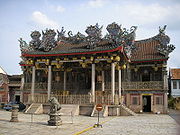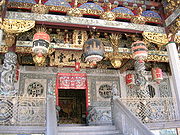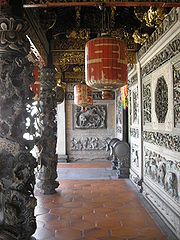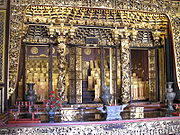
Khoo Kongsi
Encyclopedia




Kongsi
Kongsi or "clan halls", are benevolent organizations of popular origin found among overseas Chinese communities for individuals with the same surname. This type of social practice arose, it is held, several centuries ago in China...
with elaborate and highly ornamented architecture, a mark of the dominant presence of the Chinese
Malaysian Chinese
Malaysian Chinese is a Malaysian of Chinese origin. Most are descendants of Chinese who arrived between the fifteenth and the mid-twentieth centuries. Within Malaysia, they are usually simply referred to as "Chinese" in all languages. The term Chinese Malaysian is also sometimes used to refer to...
in Penang, Malaysia. The famous Khoo Kongsi is the grandest clan temple in the country. It is also one of the city's major historic attraction. The clan temple has retained its authentic historic setting, which includes an association building, a traditional theatre and the late 19th century rowhouses for clan members, all clustered around a granite-paved square. It is located in Cannon Square in the heart of the oldest part of the city of George Town
George Town, Penang
George Town was voted as one of the best cities in Asia by Asiaweek, ranked 6th in 1998 and 9th in 2000. More recently, George Town has improved a notch to rank as the 9th most liveable city in Asia in a survey of 254 cities worldwide according to an international location ratings survey by , an...
, in the midst of narrow, winding lanes and quaint-looking pre-War
World War II
World War II, or the Second World War , was a global conflict lasting from 1939 to 1945, involving most of the world's nations—including all of the great powers—eventually forming two opposing military alliances: the Allies and the Axis...
houses exuding a palpable old world charm.
History
The Khoo Kongsi is a clan association of the Leong San Tong (Dragon Mountain Hall) clan, whose forefathers came from Sin Kang clan village in HokkienFujian
' , formerly romanised as Fukien or Huguing or Foukien, is a province on the southeast coast of mainland China. Fujian is bordered by Zhejiang to the north, Jiangxi to the west, and Guangdong to the south. Taiwan lies to the east, across the Taiwan Strait...
province. The Khoos were among the wealthy Straits Chinese traders of 17th century Malacca
Malacca
Malacca , dubbed The Historic State or Negeri Bersejarah among locals) is the third smallest Malaysian state, after Perlis and Penang. It is located in the southern region of the Malay Peninsula, on the Straits of Malacca. It borders Negeri Sembilan to the north and the state of Johor to the south...
and early Penang. In the 19th century, the clan complex resembled a miniature clan village, with its own self-government as well as educational, financial, welfare and social organisations. The clan temple was built in 1906 when the Khoo clan was at the height of wealth and eminence in Penang society.
The forefathers of the Khoo family who emigrated from South China
Northern and southern China
Northern China and southern China are two approximate regions within China. The exact boundary between these two regions has never been precisely defined...
built it as a clanhouse for members of the Khoo family in 1851. It was burnt down in 1894, allegedly struck by lightning, and the Chinese believed that it was due to its resemblance to the Emperor's palace, which provoked the gods. A scaled-down version was later built in 1902 and completed in 1906.
Even so, the complex boasts a magnificent hall embellished with intricate carvings and richly ornamented beams of the finest wood bearing the mark of master craftsmen from China
China
Chinese civilization may refer to:* China for more general discussion of the country.* Chinese culture* Greater China, the transnational community of ethnic Chinese.* History of China* Sinosphere, the area historically affected by Chinese culture...
. The clan temple is dedicated to the clan's patron deities and also houses a collection of ancestral tablets. Chinese opera
Chinese opera
Chinese opera is a popular form of drama and musical theatre in China with roots going back as far as the third century CE...
s are still staged at the theatre during the seventh lunar month.
Like many such clan associations in South East Asia, Khoo Kongsi is no longer the center of important social activities and functions that it once held. Different strategies and ideas are being implemented to redefine the place of clan associations in the 21st century.

